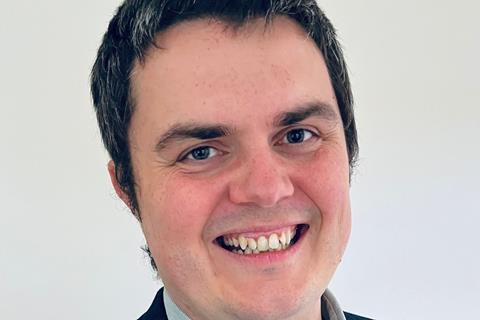
“Healthy intensity” is how Paul Ridd describes the final few weeks of prep in the build-up to his first edition as director of the Edinburgh International Film Festival (EIFF), which takes place from August 15-21.
Ridd joined towards the end of 2023, and relocated from London to Edinburgh for the job. For some, the task of resurrecting a festival with close to 80 years of history, that had been (almost) brought to its knees by what former parent charity the Centre for the Moving Image (CMI) described as “a perfect storm” of cost issues, would be too daunting.
But the former head of acquisitions at UK distributor Picturehouse Entertainment was not deterred. “With recent history there was an incredible moment to come and be involved with a 77-year-old start-up, to build everything up,” he explains.
Ridd has been involved with several festivals over the years, as a programme advisor to the BFI London Film Festival, Karlovy Vary and Sheffield Doc Fest, and through Picturehouse’s close links with Sundance: London. This is his first time captaining the ship.
His aim was to create a festival that’s “honouring tradition of the past, but also doing something new”.
Ridd, who has been a regular at EIFF across his career, including last year’s more scaled-back edition under the guidance of Kate Taylor, has been working alongside the festival’s board comprising Trainspotting producer Andrew Macdonald, former Disney exec Peter Rice and Aftersun producer Amy Jackson. The new-look board was formed in 2023 with the support of Screen Scotland, EIFF’s primary funder, to resurrect the festival.
Emma Boa, a long-standing EIFF employee, returns as festival producer. Ridd has also been in touch for pearls of wisdom with former EIFF directors, including Lynda Myles, who will be honoured at EIFF with a Bafta Scotland outstanding contribution to film award, plus Mark Cousins and Mark Adams.
The much-loved cèilidh – a traditional Scottish and Irish dance and gathering – is returning, although Ridd admits he has never been to a cèilidh before. “I have been to cèilidh -adjacent events,” he confirms.
He has also leaned into the ‘international’ element of the festival’s moniker, programming films from the countries such as Iran, Mexico, India and Kazakhstan, as well as homegrown fare. “We’ve been very much thinking about local and international audiences,” says Ridd.
“I had this feeling from day one that having this international element was very important,” he continues. “It was mutually beneficial to local film, to UK film and Scottish film to have this international context. I don’t want to in any way seal off any part of the programme.
“We don’t have a doc section, we have docs alongside narratives. We have films from all around the world in competition, out of competition, alongside each other. I don’t want to be isolating a particular national cinema within the programme.”
In terms of innovation, Ridd has endeavoured to ”physically, existentially” align EIFF with the wider arts festival that commands the Scottish city in August, the Edinburgh Fringe.
”We’re screening films in venues that are a few moments’ walk away from all the other live performances,” he explains, with cinema pop-ups in venues in the heart of the Fringe action, such as Summerhall, 50 George Square and Inspace.
For the first time, tickets to film festival events will also be available to buy through the Fringe app.
“The dream would be that somebody would come up with a film to our festival, show it, meet somebody from the other creative arts being showcased here, collaborate, and two to three years down the line we’re showing a film that’s come from that collaboration,” says Ridd.
Ticket sales have been, beams Ridd, “amazing” so far, with opening night film The Outrun, The Substance, Alien: Romulus and Timestalker audience hits.
Ridd has also been impressed with how well the competition titles, such as Will Seefried’s Lilies Not For Me and Nina Conti’s Sunlight, have been selling.
An undeniable downside of positioning the festival in August is increased costs. There isn’t a cupboard spare in Edinburgh across the month, with transport costs also inflated. EIFF moved to June in 2008, with Kristy Matheson, now director of the BFI London Film Festival, moving it back to August for her one edition in charge of EIFF, in 2022. Ridd is confident that the August slot remains “an advantage”.
“We’ve been fortunate enough to be able to be able to invite many of our filmmakers to stay with us for a few nights. I’d love to be able to continue to do that. I’m very aware of some of the restrictions that are in place,” he says.
“We’ve tried to make our industry offering as affordable as possible, we don’t have a very expensive accreditation fee for industry folk, and our press accreditation is free, so we’ve tried to make that as cost effective for people as possible. We also instituted a kind of ‘pay what you can’ policy on a lot of our screenings, which means that people can kind of access a lot more films as well.”
August also puts EIFF in the same corridor as the busy autumn festival season, with Venice, Toronto, San Sebastian and, crucially, BFI London Film Festival following soon after. Was it tough to secure films in this window?
“It was a difficult proposition… Our aim is that in the future we’ll focus more and more on world premiere titles in selection so we really feel like Edinburgh is a global launch platform for cinema and for independent films, and for films all over the world. In terms of the difficulty in securing titles, having the incredibly generous support from the Connery foundation for the prize was a really helpful leverage point,” explains Ridd, highlighting the £50,000 Sean Connery Prize For Feature Filmmaking Excellence, which sits alongside the £15,000 Thelma Schoonmaker Prize for best short.

Around 2,500 submissions were received for these prizes, with 10 spots in the feature competition and eight shorts up for grabs. Titles competing for the Sean Connery prize include Daisy-May Hudson’s fiction debut Lollipop and Bryan Carberry’s AI-doll documentary Smiles And Kisses And You.
Out of competition, Daniel Reisinger’s unconventional romantic comedy And Mrs starring Aisling Bea and Colin Hanks and Euros Lyn’s vampire comedy The Radleys, headlined by Damien Lewis, are among the world premieres.
Future plans
North American festivals, like Sundance, Toronto and Telluride are all inspirations for the direction of travel Ridd would like EIFF to move in.
He describes Sundance as the “gold standard” while appreciating Telluride’s use of “non-traditional venues, launching films that haven’t been seen anywhere else in the world, and give a global platform to new and emerging talent, as well as established filmmakers”.
From Toronto, he took inspiration for EIFF’s inaugural Midnight Madness strand. “If we can achieve half of the energy you can get a Midnight Madness screening at TIFF, then we would have achieved something really beautiful.”
Ridd is keen to keep the size of the festival consistent next year, which consists of 37 features, four rep titles, five shorts programmes and a three-day industry programme.
“We don’t have any ambitions to massively expand the number of films we show,” he explains. “One of the things I love about having this sort of programme is that many people will have seen the same films, and the conversations that are emerging will be unified. I don’t like the idea of us spreading ourselves too thin.”
Edinburgh Filmhouse, which used to be the festival’s hub but shut when parent charity CMI went under, has also risen from the ashes, and is set to re-open around the turn of the year, saved by a team of former Filmhouse staff and under the ownership of a local property management group, Caledonian Heritable, with whom the Filmhouse team has signed at 25-year lease. Will EIFF also return to the Filmhouse?
“We are very committed to the idea of using the spaces we’ve used this year for our screenings,” says Ridd, with Edinburgh’s Picturehouse, the Cameo Cinema, this year’s cinema hub. “Working with the Filmhouse would be brilliant once they’re reopened, and expanding our footprint to include it.”
This year’s industry offering includes a robust line-up of speakers, such as WME Independent’s co-head Alex Walton, Civil War filmmaker Alex Garland and BBC Film director Eva Yates, and it is an area Ridd is keen to build upon. “I would love our industry programme to become a kind of destination industry event every year. That goes part and parcel with securing more world premieres and securing bigger films.”
There is no time limit to Ridd’s contract, and so can enjoy room to grow with the festival. “This is the first year. We’re trying some stuff out, we’re seeing what works, and we’ll learn from it come September.”
























No comments yet